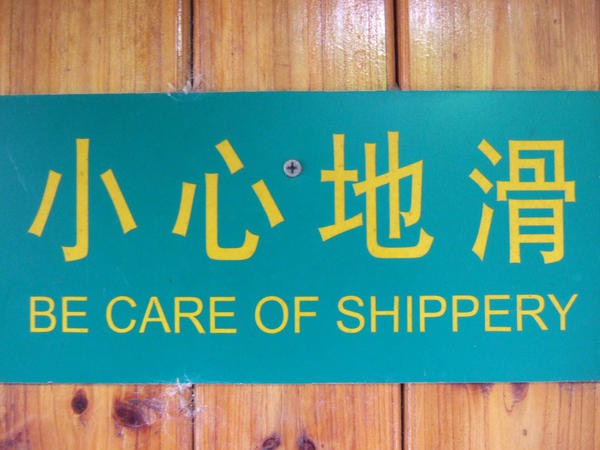
by Karen Newcombe
Everyone has seen the photos that get passed around the Internet as jokes – bad translations in signs and instruction manuals that don't quite hit the mark. These may hit the funny bone, but they don't quite communicate their intended message.
English is a notoriously difficult language – a "shippery" thing, constantly changing shape, with hot catch phrases and business jargon becoming popular today, only to sound dated and overused a few months from now. While mis-tranlated menus and street signs can be funny, it's not very amusing if your marketing materials or corporate communications get more attention for their flaws than for their content.
Anyone for whom English is a second or third language can find it challenging to make their English documents hit the right tone and language for the intended audience. Even documents translated by top tier translation services can have flaws in them that sound odd, are not right for a particular industry, or may have slightly unusual syntax. Translators are not necessarily also writers, or may not have good familiarity with a particular industry or product and the right terms to use.
Fortunately, there are thing you can do to help your documents pass muster with native English speakers:
- Hire an English major: If your corporate budget allows it, hire someone who majored in English, and make it one of their roles to review all documents before they are published or sent to clients. Send them to training to learn about your industry, and make sure all incoming trade publications cross their desk so they can keep up with changes.
- Find an industry expert: Find an expert to work with who is well-versed in the jargon and terminology used in your industry and is also a native English speaker. Arrange with them to review your documents to ensure they sound right. The more experienced the person, the better – they'll know things about the business that new graduates haven't had time to learn yet. How about that retired former director with time on his hands?
- Work with a professional writer or editor: A professional writer will help your documents in many ways, from fact-checking to researching the most current terminology to bringing your grammar, spelling, and syntax into alignment. Professional writers have a great feel for the constantly shifting changes in English since it is their primary tool of work. They can help you achieve a specific tone of voice (humorous, formal, enthusiastic, reverent) while emphasizing the message you seek to get across. Even if your writer doesn't speak your first language, they can help your English documents achieve your goals.
P.S. This advice is also good for those whose industry is so technically oriented that every document is an impenetrable forest of jargon. Get someone to help you translate your tech talk into everyday language, and see how much happier your clients are with your materials.
